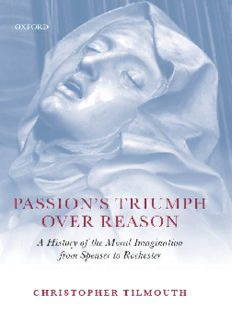Table Of ContentPASSION’S TRIUMPH OVER REASON
This page intentionally left blank
Passion’s Triumph
over Reason
A History of the Moral Imagination from
Spenser to Rochester
CHRISTOPHER TILMOUTH
1
1
GreatClarendonStreet,Oxfordox26dp
OxfordUniversityPressisadepartmentoftheUniversityofOxford.
ItfurtherstheUniversity’sobjectiveofexcellenceinresearch,scholarship,
andeducationbypublishingworldwidein
Oxford NewYork
Auckland CapeTown DaresSalaam HongKong Karachi
KualaLumpur Madrid Melbourne MexicoCity Nairobi
NewDelhi Shanghai Taipei Toronto
Withofficesin
Argentina Austria Brazil Chile CzechRepublic France Greece
Guatemala Hungary Italy Japan Poland Portugal Singapore
SouthKorea Switzerland Thailand Turkey Ukraine Vietnam
OxfordisaregisteredtrademarkofOxfordUniversityPress
intheUKandincertainothercountries
PublishedintheUnitedStates
byOxfordUniversityPressInc.,NewYork
©ChristopherTilmouth2007
Themoralrightsoftheauthorhavebeenasserted
DatabaserightOxfordUniversityPress(maker)
Firstpublished2007
Allrightsreserved.Nopartofthispublicationmaybereproduced,
storedinaretrievalsystem,ortransmitted,inanyformorbyanymeans,
withoutthepriorpermissioninwritingofOxfordUniversityPress,
orasexpresslypermittedbylaw,orundertermsagreedwiththeappropriate
reprographicsrightsorganization.Enquiriesconcerningreproduction
outsidethescopeoftheaboveshouldbesenttotheRightsDepartment,
OxfordUniversityPress,attheaddressabove
Youmustnotcirculatethisbookinanyotherbindingorcover
andyoumustimposethesameconditiononanyacquirer
BritishLibraryCataloguinginPublicationData
Dataavailable
LibraryofCongressCataloginginPublicationData
Dataavailable
TypesetbyLaserwordsPrivateLimited,Chennai,India
PrintedinGreatBritain
onacid-freepaperby
BiddlesLtd.,King’sLynn,Norfolk
ISBN978–0–19–921237–8
1 3 5 7 9 10 8 6 4 2
Toallthosewhohaveputtheirfaithinme.
Withgratefulthanks.
Acknowledgements
Thoughdoubtlessfatedtobereadfirst,thispageiswrittenlast,attheendof
aten-yearperiodduringwhichIhaveincurredmoredebtsthancanbeeasily
recorded.EmbeddedwithinthisbookisadoctoralthesiswhichIbeganunder
thesupervisionofFredParkerandendedunderthatofColinBurrow.Toboth
Iamgrateful:toFredforaskingsearching,formativequestions; toColinfor
insistingthatevenpassionsrequireamethod.Thethesis,principallyastudy
of Hobbes and Rochester, was examined by Paul Hammond and Richard
Tuckin2001.ItwasatRichardTuck’sinstigationthatIlaterincorporateda
discussionofFrance’slibertins´eruditsintothepresentwork.MydebttoPaul,
though, and also to Gordon Campbell, is still greater since it was they who,
as subsequent Press readers, redeemed my typescript from its worst errors
andindulgences.Myother,mostenduringdebtsaretoHowardErskine-Hill
andJohnKerrigan,bothofwhom(alongwithColinBurrow)offeredmethe
practicalsupportwhichenabledmetopersistwiththisprojectunderotherwise
adversecircumstances.Otherpeople,too,havegiventheirfriendship,advice,
orbothalongtheway,andtothemIamequallygrateful.AnneBarton,Susan
James, and Quentin Skinner all read and commented generously on early
manifestations of parts of this book, and I have profited likewise from the
sustainedsupportandinterestofSarahCain,PhilConnell,BillDavies,James
Lawson,BartvanEs,DanielWakelin,andJamesWarren.Thewritingofthese
acknowledgementsgivesmethechancealsotothankmyOUPeditors,andto
say—thoughwordscanhardlybeenough—howmuchIoweineverythingI
dotoKevinWylie.
Contents
Introduction 1
I. GOVERNANCE AND THE PASSIONS
1. PositionsinEarlyModernMoralThought 15
2. Spenser,Psychomachia,andtheLimitsofGovernance 37
3. Hamlet‘lapsedinpassion’ 75
4. RenaissanceTragedyandtheFracturingofFamiliarTerms 114
5. AugustinianandAristotelianInfluencesfromHerberttoMilton 157
II. THE RISE AND FALL OF LIBERTINISM
6. Hobbes:Fear,Power,andthePassions 213
7. TheRestorationEthosofLibertinism 257
8. Rochester:TheDisappointmentsofHobbismandLibertinism 315
Coda 372
References 381
Index 399
This page intentionally left blank
Introduction
PASSION’S TRIUMPH OVER REASON
Thisisabookaboutgovernanceandthepassions,ahistoryofphilosophical,
theological,andaboveallliteraryconstructionsoftheideaofself-control(and
indeedself-indulgence)intheperiod1580to1680.Ittracesthreemovements
essential to the story of moral psychology during this time: first, the decline
(from an initial position of dominance) of an austerely rationalist model
of self-governance, one centred on ideas of psychomachia and a hostility to
the passions; second, the growth of two alternative traditions, grounded in
AugustinianismandareinterpretationofAristotlerespectively,whichrevalued
the affections as controlled but morally constructive forces, qualities to be
harnessed, not eliminated; and third (but very differently), the emergence
of a libertine ethic of indulgence, an outlook preoccupied not with restraint
but with sexual conquests, the cultivation of power, and a longing for
constant motion. The first of these ethics fractured in the early 1600s under
the pressure of a growing recognition that reason was weak, human self-
delusion impenetrably complex, and the forces of corporeal passion and
self-interestmoreinvasiveindeterminingman’sactionsthanhadpreviously
been imagined. Burdened by such knowledge, Jacobean writers wavered in
their adherence to that earlier humanist ideal which had posited an ascetic,
supposedly transcendental faculty of reason as the mind’s sovereign power.
Seventeenth-century Calvinism, however, and some Counter-Reformation
theologiesofthesameperiodofferedanalternativetothisdisillusionmentin
theideaofmoralregeneration,aregenerationwhichcreatednewly‘sanctified’
affections—and thus a better kind of passion—within the soul. Equally,
alongside this Augustinian response, a revived Caroline interest in Aristotle
providedanothersolutiontothefalteringsofself-governance,onepremissed
onadeliberatemarriagebetweenreasonandtheemotions,theformeractively
cultivatingthelattersoastomakethemintegraltothemorallife.Meantime,
though, a third, libertine ethic also arose on the back of the collapse of
psychomachic thinking, its development fuelled both by those same factors
whichhadfirstsubvertedreason’shegemonyandbytheconsequentinterest
Description:Passion's Triumph over Reason presents a comprehensive survey of ideas of emotion, appetite, and self-control in English literature and moral thought of the sixteenth and seventeenth centuries. In a narrative which draws on tragedy, epic poetry, and moral philosophy, Christopher Tilmouth explores ho

